北师大版四年级英语知识点总结
卓越优优·教案提纲
教师: 杨爱荣 科目:新四年级英语 第一次
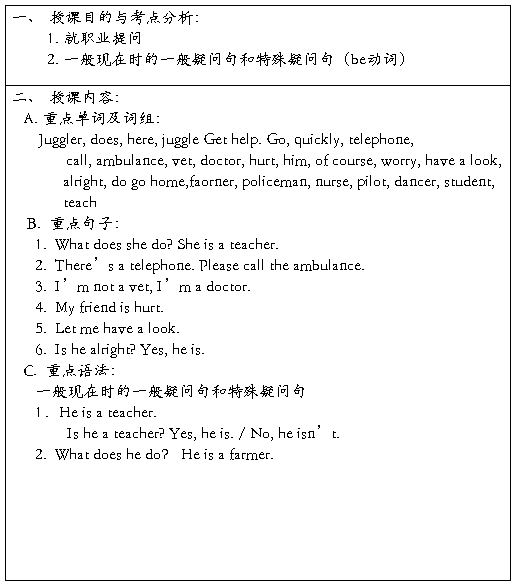
教导主任签字:
卓越优优·教案提纲
教师:杨爱荣 科目:新四年级英语 第 二 次
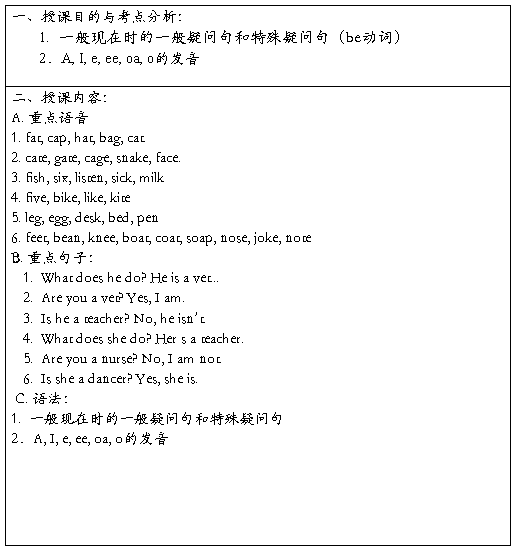
教导主任签字:
卓越优优·教案提纲
教师:杨爱荣 科目:新四年级英语 第 三 次
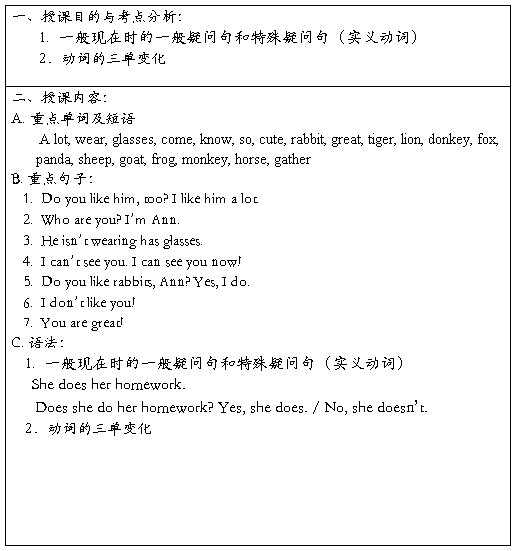
教导主任签字:
卓越优优·教案提纲
教师:杨爱荣 科目:新四年级英语 第 四 次
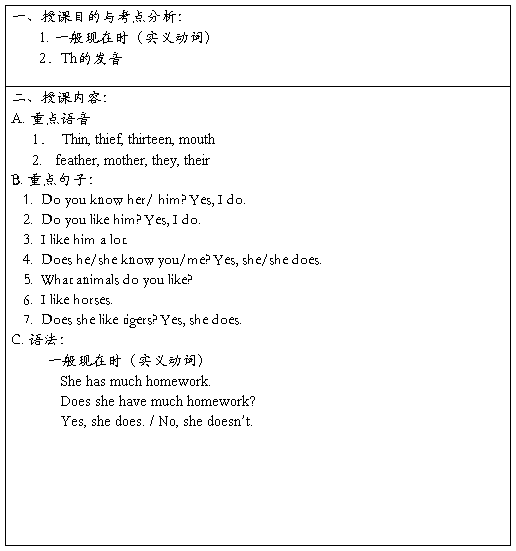
教导主任签字:
卓越优优·教案提纲
教师:杨爱荣 科目:新四年级英语 第 五 次
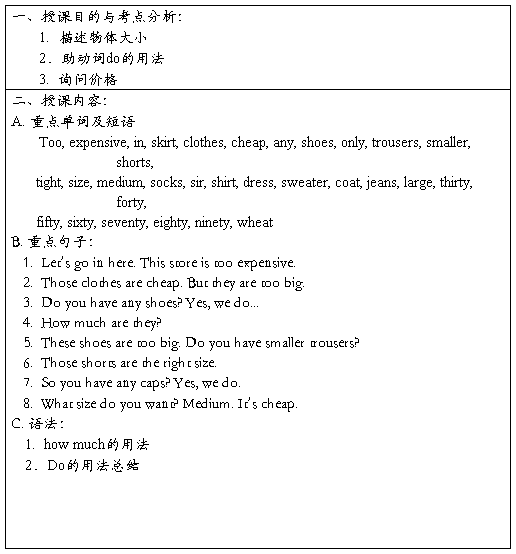
教导主任签字:
卓越优优·教案提纲
教师:杨爱荣 科目:新四年级英语 第 六 次
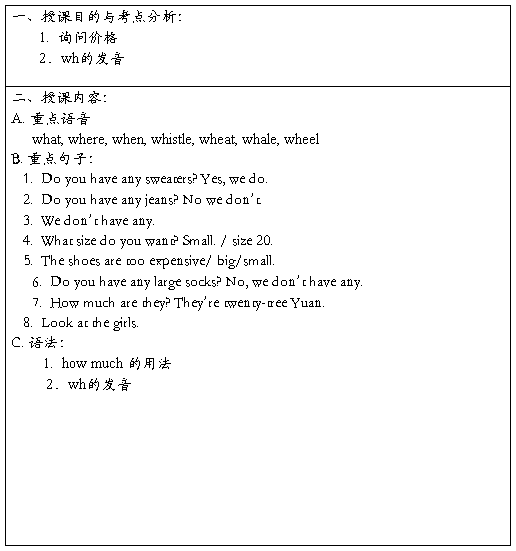
教导主任签字:
卓越优优·教案提纲
教师:杨爱荣 科目:新四年级英语 第 七 次
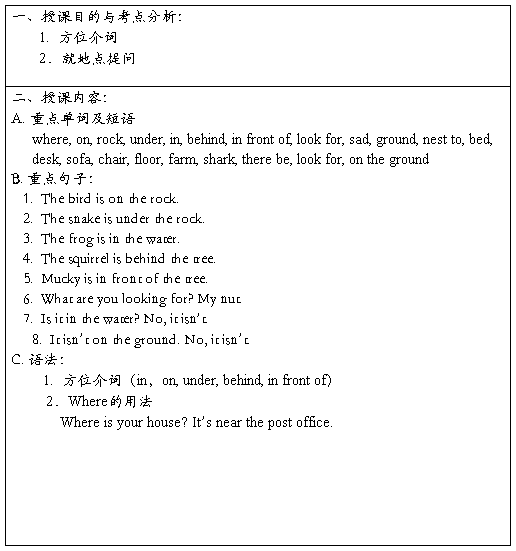
教导主任签字:
卓越优优·教案提纲
教师:杨爱荣 科目:新四年级英语 第 八 次
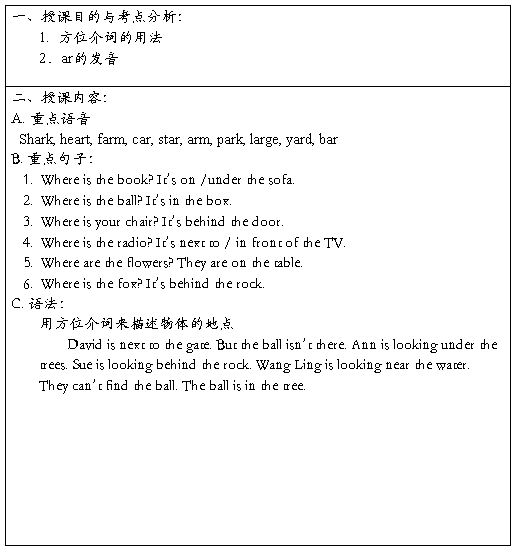
教导主任签字:
卓越优优·教案提纲
教师:杨爱荣 科目:新四年级英语 第 九 次

教导主任签字:
卓越优优·教案提纲
教师:杨爱荣 科目:新四年级英语 第 十 次

教导主任签字:
卓越优优·教案提纲
教师:杨爱荣 科目:新四年级英语 第 十一 次
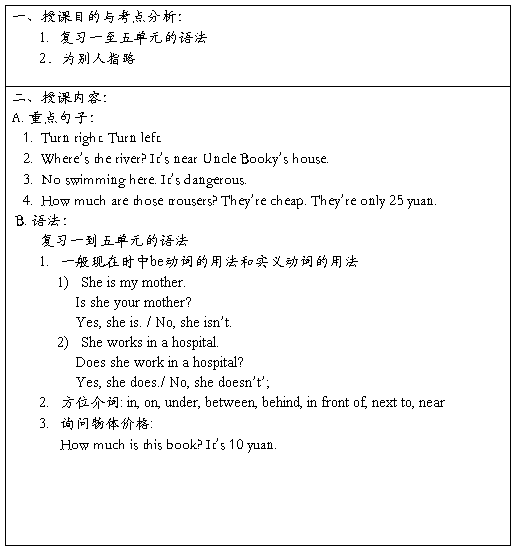
教导主任签字:
卓越优优·教案提纲
教师:杨爱荣 科目:新四年级英语 第 十二 次
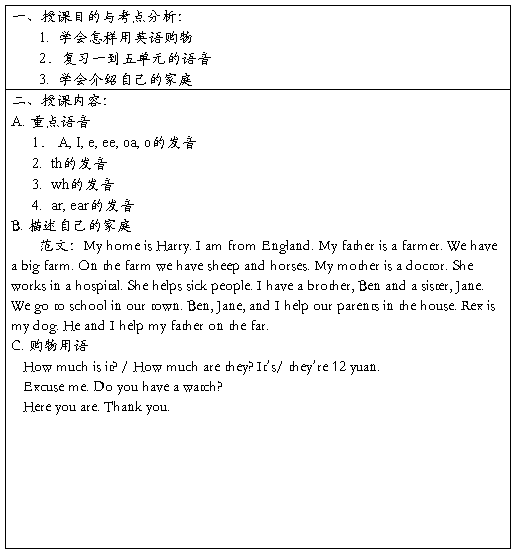
教导主任签字:
第二篇:初二英语上册(北师大版)Unit 6 Celebrations 知识点总结
-- 中国首家承诺学习效果的在线教育公司
初二英语上册(北师大版)Unit 6 Celebrations
知识点总结
一、重点词汇
· 原文再现
Christmas gifts
圣诞礼物
· 基本用法
gift n.礼物
I got a gift on Christmas Day.
在圣诞节那天我得到了一个礼物。
· 知识拓展--词义辨析
gift/present
二者都有“礼物,赠品”之意。
gift:含义广,既可指真诚相送的礼物、赠品或生日、节日礼物,又可指捐赠的物品或捐款等。
present:普通用词,指给亲朋好友的礼物,赠者与被赠者之间存在某种个人关系,所赠礼物一般不是
很昂贵的。
· 原文再现
In the United States the Christmas lasts from Thanksgiving through the beginning of January.
在美国的圣诞节从感恩节开始持续到一月。
· 基本用法
1. last vi. 持续;维持。如:
The condition will last some time.
这种状况将会持续一段时间。
The games lasted only half the normal time.
-- 中国首家承诺学习效果的在线教育公司
比赛只持续了通常时间的一半。
2. last adj. 最后的。如:
I am the last one to come here.
我是最后一个来这的。
· 原文再现
Christmas celebrates the birth of Jesus Christ.
圣诞节是庆祝耶稣基督的诞生。
· 基本用法
celebrate v.庆祝,歌颂,赞扬
(过去式:celebrated 过去分词:celebrated 现在分词:celebrating 第三人称单数:celebrates)
Tom celebrated his 24th birthday two days ago.
汤姆两天前庆祝了他的24岁生日。
· 知识拓展
相关单词
celebration n. 典礼;庆祝。如:
The celebration will run from next Monday.
庆祝活动从下周一开始。
词义辨析:celebrate/congratulate
这两个动词均有“庆祝,祝贺”之意。
celebrate:通常指举行盛大隆重的仪式庆祝或纪念有意义的日子或某件事情,多暗示节日般的欢
乐场面。
congratulate:指对他人祝贺为目的,希望他人幸福或走运。
· 原文再现
Every year, my father sends many Christmas cards.
每年我的父亲送我许多圣诞礼物。
· 基本用法
-- 中国首家承诺学习效果的在线教育公司
send vt.送,寄,发送(过去式:sent 过去分词:sent 现在分词:sending 三单:sends)
I sent an Email last night.
昨晚我发送了一封电子邮件。
send sb. sth.= send sth.to sb. 指:将某物寄给某人
I sent a copy to the school principal.
我寄了一份复印件给校长。
Can you send to me an application letter?
您能否寄给我一份申请信?
· 知识拓展--相关短语
1. send for 派人去请
I've sent for the doctor.
我已经派人去请医生了。
2. send up 发射
More satellites will be sent up into space.
一定有更多的人造卫星将被发送进太空。
message
· 原文再现
Thanks for your message.
谢谢你的信息。
· 基本用法
message n. 消息,通讯。如:
He sent me a message.
他给我发了一条信息。
· 知识拓展--相关短语
1. leave a message for sb.给某人留口信
Let's leave her a message to meet us at the railway station.
让我们留个口信,通知她到火车站去接我们。
2. take a message for sb.给某人捎口信
Would you be kind enough to take a message to him?
-- 中国首家承诺学习效果的在线教育公司
您能捎个信儿给他吗?
· 基本用法
include vt. 包括,包含,指包含其中的一部分
(过去式: included 过去分词: included 现在分词: including 第三人称单数: includes)
A good British breakfast always includes sausages.
一顿丰盛的英式早餐总会包括香肠。
· 知识拓展--相关单词
1. included adj. 包括在内,无比较级。
Everyone laughed, me included.
每个人都笑了,包括我在内。
2. including prep. 包括;包含在内,和其后的名词或代词一起形成介宾短语。
There are 40 students in the classroom, including me.
包括我在内,教室里有40名学生。
· 基本用法
adj. wise 英明的,明智的。如:
The boy’s parents are very wise.
那个孩子的父母是非常明智的。
· 知识拓展--词义辨析
bright/clever/wise/smart
这些形容词均含有“聪明的”之意。
bright: 口语常用词,多指年轻人,尤指小孩思路敏捷,理解力强,机灵等。
clever: 强调头脑灵活,接受新事物快,有智有谋,但不一定暗示全面妥当地考虑问题。
wise: 侧重不是一般的聪明伶俐,而是有远见,有智慧,能明智地处理问题。
smart: 普通用词,与bright和clever的意思很相近,但更强调机灵。
· 原文再现
-- 中国首家承诺学习效果的在线教育公司
“Season’s Greetings”
“节日问候”
· 基本用法
greeting n. 祝贺;问候。如:
He gives us a cheery greeting.
他愉快地跟我们打招呼。
· 知识拓展--相关单词
greet v. 迎接;问候;致敬。如:
I greet you in the name of the President.
我代表总统前来迎接你。
They greet each other with a hug and say Merry Christmas! 他们拥抱着打招呼,说“圣诞快乐”。
suppose
· 原文再现
I think red is supposed to be a lucky color.
我认为红色应该是一种幸运的颜色。
· 基本用法
1. suppose v. 推想;假设。如:
Suppose you are a great scientist.
假设你是一名伟大的科学家。
be supposed to意为“应该;理应”,其后接动词原形,有时为进行式或完成式。如: You are supposed to be there before dark.
你应该在天黑前赶到那儿。
He’s supposed to be doing his homework at home now.
他现在应该在家里做作业。
He is supposed to have written us a letter.
他本来应该给我们写封信的。
2. suppose v. 想;认为;料想,此时其后接否性的宾语从句时通常将否定转移到主句上。如: I don’t suppose he is really ill.
我看他不是真病了。
-- 中国首家承诺学习效果的在线教育公司
spare
· 基本用法
1. spare adj.多余的,剩下的。如:
There are spare food here.
这里还有多余的食物。
In her spare time she read books on cooking.
业余时间里她看一些烹饪方面的书籍。
2. spare v. 抽出。如:
Can you spare me five minutes?
你能抽出五分钟和我谈谈吗?
· 原文再现
There are certain traditions that people follow on New Year’s Day. 春节人们会遵循一定的传统习俗。
· 基本用法
certain adj. 某一个,某些;确定的。如:
There are certain things he does that drive me mad.
他的某些举动让我很生气。
It’s certain that every effect must have a cause.
无疑每个结果必定有其原因。
· 知识拓展
相关短语
make certain 确定,相当于make sure。如:
Make certain you know what time the train goes.
你要弄清楚火车什么时候开。
相关句型/结构
sb. be certain that? 某人确定??。如:
I am certain that they knew who I am.
我确定他们知道我是谁。
-- 中国首家承诺学习效果的在线教育公司
be certain to? 确信(深信)。如:
You are certain to be happy with them.
跟他们在一起你肯定会感到快乐。
cheer
· 原文再现
It was New Year and every clapped and cheered and shouted.
新的一年,每一个人都鼓掌、欢呼和呐喊。
· 基本用法
cheer vi. 欢呼 (过去式:cheered 过去分词:cheered 现在分词:cheering 第三人称单数:cheers) We cheer and wave the red flags.
我们欢呼和挥舞着红旗。
· 知识拓展--相关短语
1. cheep up(使)高兴,(使)振作;打起精神。如:
Cheer up! I’m sure you’ll feel better tomorrow.
振作起来!我肯定你明天回好些的。
2. cheer sb up 使某人高兴,使某人振作
They need a holiday to cheer them up.
他们需要有一个休假来使他们振作起来。
arrive
· 原文再现
We arrived at Times Square at about eight o’clock.
大约八点钟的时候,我们到达泰晤士广场。
· 基本用法
arrive vi. 到达(过去式:arrived 过去分词:arrived 现在分词:arriving 三单:arrives) It’s 8 o’clock, but he doesn’t arrive.
八点了,他还没有来。
arrive in+大的地点, arrive at+小的地点 ,表示:到达某地
We arrive in Beijing.
我们到达北京了。
I arrive at school.
-- 中国首家承诺学习效果的在线教育公司
我到学校了。
· 知识拓展--词义辨析
arrive/get to/reach
1. 三者均有“到达”之意,意义基本相同,但arrive(in)/(at) 与reach, 是正式用语,get to 是通俗用词, 常用于口语。
2. arrive 是不及物动词,表到达什么地点时,后面应接前置词in或at,一般来说,到达一个大地方 常用in,到达较小的地方常用at, 但这不绝对的。(与地点副词连用时当然不用任何前置词) He arrived in Beijing yesterday.
他昨天到的北京。
When he arrived at the stop, the bus had left.
当他到车站时,车已经走了。
3. reach 是及物动词,后面直接跟表地点的名词。
When does the train reach London?
火车什么时候到伦敦?
4. get to 只是较口语化,接地点副词时不用to。
He got to the shop at 5:00 o’clock this afternoon.
他今天下午5点到商店。
When I got there, the film had been on for 5 minutes.
当我到那儿时,电影已经开演5分钟了。
· 原文再现
The date of the Chinese New Year changes each year but it always comes somewhere between
January 21 and February 20.
中国的春节的日期每年都在变化,但是它通常是在1月21到2月20之间。 · 基本用法
somewhere adv. 指“在某处;到某种程度;大约”通常用于肯定句中; 而anywhere 指“什么地方,任何地方”,常用在否定句或疑问句中。 I must have seen you somewhere before.
我以前一定在某处见过你。
-- 中国首家承诺学习效果的在线教育公司
I haven’t got anywhere to live.
我还没有找到住的地方。
Did you try to get help from anywhere?
你努力从哪儿寻求帮助吗?
surprise
· 原文再现
We throw a surprise party for Dad.
我们为爸爸准备了一个惊喜的聚会。
· 基本用法
1. surprise n. 惊奇,吃惊,是不可数名词,in surprise意为“惊奇地,惊讶地”。如:
She looked up in surprise when I shouted.
我叫喊时,她吃惊地抬起头来看。
“to one's surprise”指“让某人感到吃惊的是”。
To my surprise, he gave me the money immediately.
令我惊奇的是,他立刻把钱给了我。
2. surprise v. 使吃惊,使惊讶。
The news surprised Mike.
那则新闻使迈克很吃惊。
· 知识拓展--词义辨析
surprising/surprised
有一类动词后面加ing和ed转化为形容词。加ing表“令人...的”,加ed表“使人感到...的”
如:interesting/interested; terrifying/terrified; exciting/excited; amazing/amazed; relaxing/relaxed等。
surprising 意为:令人吃惊的,如:
He won the first prize. That's surprising.
他得了第一名,这令人很吃惊。
We are surprised at the news that he won the first prize.
我们对他得了第一名的消息感到很吃惊。
· 基本用法
-- 中国首家承诺学习效果的在线教育公司
1. notice n. 公告牌;通告;布告。是可数名词。如: I posted a notice about it on the bulletin board. 我把有关那件事的通告贴在布告栏上了。
2. notice n. 注意,注意力,是不可数名词。如:
Her appearance attracted my notice.
她的外表引起了我的注意。
3. notice v. 注意到,留心,看到。如:
Did you notice Jack come in?
你注意到杰克进来了吗?
breath
· 原文再现
I’m out breath.
我喘不过气来。
· 基本用法
breath n.呼吸,气息,短暂的休息。如:
I take a deep breath.
我做了一个深呼吸。
· 知识拓展
相关短语
1. out of breath 上气不接下气
When I hurried to school, I was almost out of breath. 当我赶到学校时几乎是上气不接下气。
2. hold one's breath 屏住呼吸
We held our breath in excitement.
我们激动地屏息凝神。
相关单词
breathe v. 呼吸。如:
It is difficult to breathe at these altitudes.
在这些高的地方很难呼吸。
-- 中国首家承诺学习效果的在线教育公司
· 原文再现
We’ll give people a map and directions. 我们会给人们地图和方向。
· 基本用法
direction n. 方向。如:
Which direction does your room face? 你的房间面向哪个方向?
· 知识拓展--相关单词
direct v. 指挥;指示;命令。如:
He directed the building of the new bridge. 他指挥修建这座桥。
direct adj. 直接的;笔直的;坦白的。如: I’m in direct contact with the workers. 我与工作人员保持着直接的联系。
public
· 原文再现
Thanksgiving is a public holiday.
感恩节是一个公众的节日。
· 基本用法
1. public adj. 公众的;公共的。如:
This is a public place.
这是公众场所。
in public 指”公开地,当众“
The leader rarely shows herself in public.
这位领导很少在公众场合露面。
2. public n. 公众。如:
The area has been fenced from the public.
该地区为防止民众进出而围起来。
set off
· 基本用法
-- 中国首家承诺学习效果的在线教育公司
set off 意为“燃放(焰火,爆竹)”。如:
We set off on fireworks during spring festival.
春季期间我们燃放烟花。
· 知识拓展--相关短语
1. set up 建立,准备。如:
He wants to set up a factory.
他想建立一个工厂。
2. set out 出发,动身。如:
We plan to set out at 9:00 tomorrow morning.
我们计划明天早上九点出发。
二、重点句型
每年的这个时候,人们会给朋友和家人寄贺卡。
· 基本用法
send sth. to sb.意为“给某人寄某物”。如:
Western people often send Christmas cards to their friends before Christmas.
西方人经常在圣诞节前给他们的朋友寄贺卡。
send sth to sb =send sb sth
Please send a postcard to me when you are in France.
=Please send me a postcard when you are in France.
你在法国的时候,请给我寄张明信片。
Young children wake up on Christmas morning?
小孩子们在圣诞节早上醒来??
· 基本用法
wake up意为“叫醒;醒来”。如:
I always wake up at seven in the morning.
我通常早上七点醒。
What time do you usually wake up in the morning?
通常你早晨几点钟醒?
-- 中国首家承诺学习效果的在线教育公司
另一些重要的人是千里迢迢带来礼物的三位英明的男人。
· 基本用法
本句中,the three wise men在句中是先行词,who是引导词,引导定语从句修饰“the three wise men”。
引导词在从句中做主语。如:
I don’t know the girl who stands under the tree.
我不知道站在树下的那个女孩是谁。
Everyone is talking about the boy who saved a little girl from the river. 大家都在谈论从河里救小女孩的那个男生。
谢谢你的信息。
· 基本用法
Thanks for sth./doing sth. 意为“因为某事/做某事,谢谢??”。如: Thank for your invitation.
谢谢你的邀请。
Thanks for helping me.
谢谢你帮助我。
It’s very special time now because Chinese people are getting ready to
现在是一个特别的时期,因为中国人正在为欢度春节做准备。
· 基本用法
get ready to do sth.意为“为做某事做准备”。如:
We are getting ready to have a trip.
我们正在为旅行做准备。
get ready for sth.意为“为某事做准备”。如:
We are getting ready for the English Evening.
我们正在为英语晚会做准备。
· 知识拓展--相关短语
-- 中国首家承诺学习效果的在线教育公司
be preparing for sth= get ready for sth,意为:为...做准备。 What are you preparing for the exam?
为考试你都做了哪些准备?
看他们你会觉得很有趣。
· 基本用法
It + be + adj.(for sb)+to do sth.意为“做某事(对某人来说)是??”。如:
It is dangerous to play soccer on the street.
在街上踢足球很危险。
It is necessary for us to keep healthy.
对于我们来说保持健康是有必要的。
我和张先生一家在北京过了春节。
· 基本用法
spend?with sb.意为“与某人一起度过??”。如:
I spent most of the time with my brother today.
今天我大多数的时间是和我的弟弟一起度过的。
I cherish each moment I spend with you.
我珍惜和你在一起的每一个时刻.
spend的用法如下:
1. spend time /money on sth. 在??上花费时间(金钱)
I spent two hours on this maths problem.
这道数学题花了我两个小时。
2. spend time /money (in) doing sth. 花费时间(金钱)做某事。 They spent two years (in) building this bridge.
造这座桥花了他们两年时间。
人们开心地笑着,祝福我们新年快乐。
· 基本用法
-- 中国首家承诺学习效果的在线教育公司
wish sb. sth.祝福某人某事,这里是wish后接双宾语的用法。wish后也可以接名词、代词、动词不定式
或that从句作宾语。
If possible, I wish to work in a school.
如果可能的话,我希望在学校工作。
I wish you a good journey.
祝你旅途愉快。
Do you wish to say anything?
你想说什么吗?
I wish that you would tell her the truth.
我希望跟她说实话。
Finally, it was time for the “countdown”.
最后,是倒计时的时间了。
· 基本用法
It’s time for?意为“是??的时间”。如:
It’s 21:00. It’s time for sleep.
九点了,该睡觉了。
Call her down, it's time for supper.
该吃晚饭了,叫她下楼来。
The kids won’t take care of everything.
孩子们不会把每件事都做好。
· 基本用法
take care of 意为“照顾/做某事”,相当于look after。如:
Would you help me take care of my dog?
你愿意帮我照顾我的狗吗?
There was no one else to take care of their children.
没有别人可以照料他们的孩子。
Rob will make a mess in the kitchen.
Rob把厨房弄的一团糟。
· 基本用法
-- 中国首家承诺学习效果的在线教育公司
make a mess意为“搅乱;搞成一团糟”。如:
He managed to make a mess of it.
他真不错,把事情弄得一团糟。
If you cook, please just don't make a mess.
你要是做饭的话,拜托别弄得一团糟.
Jessica will invite all the guests to the party.
杰西卡会邀请所有的客人参加晚会。
· 基本用法
invite sb. to sp.意为“邀请某人去某地/邀请某人参加……”。如:
Lily invites us to her house this Saturday.
这周六莉莉邀请我们去她家。
She invited him to her house to attend her 26th birthday party.
她邀请他去参加她在家举行的 26 岁生日聚会。
The kids will buy birthday presents for their dad.
孩子们会给他们的爸爸买生日礼物。
· 基本用法
buy sth. for sb.意为“为某人买某物”。如:
I want to buy a present for my mother.
我想给我的妈妈买一份礼物。
英语中,有些动词可以跟双宾语,而双宾语变换位置时,需借助于介词for。这样的动词主要有: book sb. sth. = book sth. for sb. 为某人预定某物
buy sb. sth. = buy sth. for sb. 为某人买某物
choose sb. sth. = choose sth. for sb. 为某人选某物
cook sb. sth. = cook sth. for sb. 为某人煮某物
draw sb. sth. = draw sth. for sb. 为某人画某物
fetch sb. sth. = fetch sth. for sb. 为某人去取某物
find sb. sth. = find sth. for sb. 为某人找到某物
fix sb. sth. = fix sth. for sb. 为某人准备某物
get sb. sth. = get sth. for sb. 为某人拿来某物
make sb. sth. = make sth. for sb. 为某人做某物
-- 中国首家承诺学习效果的在线教育公司
order sb. sth. = order sth. for sb. 为某人订购某物
pick sb. sth. = pick sth. for sb. 为某人采摘某物
prepare sb. sth. = prepare sth. for sb. 为某人准备某物
save sb. sth. = save sth. for sb. 为某人留某物
sing sb. sth. = sing sth. for sb. 为某人唱某物(歌)
I’ll help you look for it.
我将帮你找它。
· 基本用法
help sb. do sth.意为“帮助某人做某事”。如:
I will help you pass the exam.
我将帮助你通过考试。
I helped him (to) find his wallet.
我帮他找到了他丢失的钱包。
In many countries, when people blow out the candles on their birthday cake, they make a wish.
在很多国家,当人们吹灭蛋糕上的蜡烛时,他们会许一个愿望。
· 基本用法
1. blow out意为“吹灭”,其后可以直接跟宾语。
Don't blow out the light.
别把灯吹灭。
2. make a wish意为“许个愿望”。如:
Make a wish when you see a meteor in the sky. Then your wish will be realized.
当你看到流星时许个愿望,那么你的愿望就会实现。
In the evening, they knock on neighbors’ doors and ask for candies. 晚上,他们敲邻居的门,向他们要蜡烛。
· 基本用法
1. knock on one’s door意为“敲某人的门“
He knocks on the old man’s door in the early morning. 他一早就敲那位老人的门。
2. ask for sth.意为“要某物”。如:
-- 中国首家承诺学习效果的在线教育公司
A man come to the door and ask for food.
一个男人来到门前讨饭吃。
called “trick or treating”?
这被叫做“恶作剧”??
· 基本用法
be called意为“被称为/叫做??”,在这里是被动语态的用法。 一般现在时的被动语态结构为:be (am/is/are) +动词过去分词。 The little cat is called Mimi.
这只小猫被叫做咪咪。
He is called Shakespeare of China.
他被称为是中国的莎士比亚。
三、重点语法
一般现在时
· 定义
1. 表示习惯经常的动作,常与表示频率的时间状语连用。这些时间状状语有:always, usually,regularly,
every morning/night/evening/day/week/year,often,sometimes,occasionally,from time to time, twice a
week,rarely,seldom,once a month, hardly, ever, never等。
I leave home for school at 7:00 every morning.
我每天早上七点离开家去学校。
2. 表示客观真理。
The earth moves around the sun.
地球围绕太阳转。
Shanghai lies in the east of China.
上海位于中国东部。
3.表示主语具备的性格、能力、特征和状态。
I don't want so much.
我不想要太多。
She writes good English but does not speak well.
她英语写得好,但是说得不好。
-- 中国首家承诺学习效果的在线教育公司
4. 表示格言警句。
Pride goes before a fall.
骄者必败。
5. 表示现在的动作状态。
She is a nine-year-old girl. She studies in a primary school. 她是个九岁的女孩,在小学上学。
· 一般现在时的句型结构
1. 肯定结构:主+am/is/are+其他;主+情态动词+动词原形+其他;主+实意动词+其他
2. 否定结构:主+am/is/are+not+其他;主+情态动词+not+动词原形+其他; 主+do/does+not+实意动词原形+其他
3. 一般疑问句结构:Does/Do+主语+实意动词原形+其他?Is/Are+主语+其他?
情态动词原形+主语+动词原形+其他?
肯定回答 Yes,sb+be/助/情;否定回答No, sb+be/助/情。
现在进行时
· 定义
现在进行时态主要用于表示现在正在进行的动作,有时也可表示现阶段正在进行的动作。
My sister is talking on the phone。
我妹妹正在打电话。
· 用法
1. 现在进行时态中动词的现在分词的构成:
(1) 一般直接在动词后加-ing。
look—looking go—going
(2) 以不发音的字母e结尾的动词变成现在分词要去掉e再加-ing。 come—coming have—having make—making
(3) 以重读闭音节结尾且末尾只有一个辅音字母的动词,变现在分词要双鞋这个辅音字母,再加-ing。
get—getting forget—forgetting shop—shopping
2. 现在进行时态的基本句型
-- 中国首家承诺学习效果的在线教育公司
肯定句:be+v.-ing
否定句:be+not+v.-ing
一般疑问句:be动词提前
Is she washing the dishes in the kitchen now?
肯定/否定回答:
Yes, she is./ No, she isn’t.
特殊疑问句:
对谓语动词进行提问时:What+be+主语+doing+其他?
What is she doing in the kitchen now?
对其他部分进行提问时:疑问词+一般疑问句?
Where is she washing the dishes now?
3. 现在进行时表示现在正在发生或进行的动作,有时也表示现阶段正在进行或发生的动作。
常与now,right now等时间状语及listen, look等标志词连用。 She is singing in the next room now.
What is your daughter doing these days?
Look! The boy is swimming in the river.
4. 现在进行时态与always连用时,表示反复出现的或习惯性的动作,常带有一定的感情色彩。
He is always helping other people.
5. 表示按计划或安排要发生的动作,这样的动词主要有go, come, leave, arrive等。
They’re coming back this afternoon.
He is leaving Shanghai for Beijing.
6. 一般不用于现在进行时态的动词。
表示态度、情感、心理状态等的动词和连系动词一般不用于现在进行时态。如:hear, see, like,
love, know, want, hope, think, wish, taste, sound等。
We have a lot of books.
She loves her mom very much.
That sounds great!
-- 中国首家承诺学习效果的在线教育公司
· 定义
一般过去时表示在过去发生的事情,其时间状语一般是表示过去的单词或短语等。
· 用法
1. 动词过去式的构成
(1) 规则动词过去式的变化可速记为“直”“去”“双”“改”四字诀。 一般情况下在动词原形后只接加-ed。如:want→wanted, play→played。 以不发音的字母e结尾的动词,去e再加-d。如:hope→hoped, live→lived。 以一个辅音字母结尾的重读闭音节单词,需先双写最后一个辅音字母,再加-ed。如:stop→stopped。
以辅音字母加y结尾的动词先变y为i,再加-ed。如:study→studied, worry→worried。
(2) 不规则动词变化,要逐一熟记。Be动词的过去式有两种形式,主语是第
一、三人称单数形式用was,
其他人称用were。
2. 一般过去时态的形式
(1) be动词过去时的句式
否定句时在was/were后面加not,即was not(wasn’t)/were not (weren’t)。一般疑问句时把was/were
提前放到句首,且首字母要大写。
(2) 实义动词过去时的句式
肯定式:主语+动词过去式+其他.
They had a good time yesterday.
否定式:主语+did not/didn’t+动词原形+其他.
They didn’t watch TV last night.
一般疑问句:Did+主语+动词原形+其他?其肯定回答常用“Yes, 主语+did.”; 否定回答常用“No, 主语+didn’t.”
—Did you go to the park yesterday?
—Yes, I did./No, I didn’t.
特殊疑问句:疑问词+did+主语+动词原形+其他?
-- 中国首家承诺学习效果的在线教育公司
What time did you finish your homework?
3. 一般过去时态的用法
(1) 主要用于过去某个时间发生的动作或状态。
My father worked in Shanghai last year.
(2) 表示过去经常或反复发生的动作,常与often, always等表示拼读的状语连用。
I often went to school on foot.
(3) 与when等连词引导的状语从句连用。
When he got home, he had a short rest.
4. 一般过去时态的时间状语
一般过去时态的时间状语有a moment ago(刚才),yesterday morning, last night/week,
the day before yesterday(前天),just now(刚才)等。
一般将来时
· 定义
一般将来时表示将来某个时间要发生的动作或存在的状态,也表示将来经常性或反复发生的动作,常与表
示将来的时间状语连用,如:tomorrow; next week/month/year?; in two days; soon;
the day after tomorrow。
· 句型结构
肯定句:主语+shall/will/be going to+动词原形+其他
否定句:主语+shall not/will not/be not going to+动词原形+其他 特殊疑问句:对主语提问,特殊疑问词+正常的谓语宾语陈述语序。
对非主语提问,特殊疑问词+一般疑问句语序。
一般疑问句:shall/will+主语+动词原形+其他?或者am/is/are+主语+ going to+动词原形+其他。
肯定回答Yes, sb shall/will/be going to.否定回答No, sb shan't/won't. · 用法
1. 表示将来某个时间要发生的动作或存在的状态,常与表示将来的时间状语连用。如:
Next month my sister will be twenty-one.
-- 中国首家承诺学习效果的在线教育公司
下个月我姐姐就21岁了。
2. 表示将来经常发生或反复发生的动作。如:
I’ll come and see you every Sunday next year.
明年我会每个星期天都来看你。
3. 问对方是否愿意干??,或表示客气的邀请。如:
Will you please sign your name here? 您能在这里签名吗?
高考不提分,赔付1万元,关注快乐学kuailexue.com了解详情。
-
小学四年级上册英语知识点归纳整理
四年级上册知识点总结Unit1Myfriends一词汇window窗户board写字板light灯picture图画door门fl…
-
最新人教版四年级英语上册知识点总结
班级:姓名:UnitoneMyclassroom一.需要掌握的单词(要求:报英语说中文,报中文说英语)classroom教室win…
-
小学四年级英语下册复习知识点归纳总结
小学四年级英语下册复习教学知识点归纳总结一语音1acakesnakegrapesfaceapplebagcathat2ewemew…
-
四年级英语知识点总结
四年级上册知识点总结读会下列句子并说说它们的中文意思然后看中文说说英语句子并能看到问句报出答句四年级上册Unit1Myclassr…
-
四年级英语下册知识点归纳
四年级英语下册知识点第一单元一对应词myyourIyououryourthisthatherethereyesnocomegote…
-
20xx新北师大版四年级数学上册知识点总结
北师大版四年级数学上册知识点总结第一单元认识更大的数1认识数级数位计数单位并了解它们之间的对应关系2亿以内数的读数方法含有个级万级…
-
小学四年级科学上册复习教学知识点归纳总结
小学四年级科学上册复习教学知识点归纳总结期末测试试题习题大全一天气1天气总是在发生变化它影响着我们的活动也影响着地球上所有生物2云…
-
北师大版小学数学四年级上册_知识点归纳
数以万或亿为单位2用四舍五入法保留近似数的方法根据题中要求看到所要保留位数的下一位如果这一位满5则向前一位进一如果不够5则舍去而不…
-
北师大版四年级数学上册知识点总结
四年级数学上册知识点总结第一单元认识更大的数1认识数级数位计数单位并了解它们之间的对应关系2亿以内数的读数方法含有个级万级和亿级的…
-
新北师大小学数学四年级上数学知识点归纳
学源教育复习资料小学数学知识点归纳四年级上人口普查亿以内数的读法写法知识点1亿以内数的读数方法含有个级万级和亿级的数必须先读亿级再…
-
小学四年级英语知识点归纳
四年级上册Unit1myclassroomThisismyclassroom.It’sbig.这是我的教室。它很大。Thedoor…